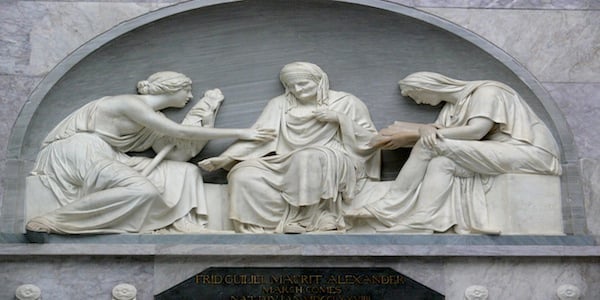Everything happens for a reason. Some things are meant to be. These well-worn clichés are bandied about by religious and non-religious alike, and the romantics among us can’t help but believe they conceal something true. Especially when we fall in love, the beloved appears as uniquely “for me.”
Does this sense of necessity belong only to poetry and fairy tales, though? Human beings are not the center of the universe, especially not you, or me. Nor are we in control of our lives. If everything happens for a reason, reason is a cruel master, since every day the lie is given to a naïve faith that we live in the best of all possible worlds. The classical belief in the arbitrary Fates often seems to capture the human situation better than a blind trust that “All shall be well, and all shall be well, and all manner of thing shall be well,” in the words of Julian of Norwich. The fact remains that most happenings of our lives don’t seem particularly significant, and worse, lots of the time things emphatically don’t work out as they should.
No matter how many times we realistically confront our contingency, however, the hope that everything is for a reason, and a good one, never quite dies. Religious people validate this intuition with a belief in Providence: there is a loving God who guides the course of every man’s life, and all of human history. Judaeo-Christian faith includes an explanation for evil and suffering in its account: beginning with Lucifer, God’s creatures have thwarted His providential plan for their happiness. Almost immediately after they were created, human beings gave themselves over to the arbitrary powers of sin and death. God’s power remains triumphant, but His providence appears as His justice, which is first our purification. As T.S. Eliot writes in the Four Quartets, quoting Julian, “All will be well and all manner of things shall be well/ By the purification in the ground of our beseeching.” Things will not always work out as they should, at least not now, and we can’t assign significance to everything that happens to us. We can trust, however, that the failure of our ideals crucifies our hope, so that it can be reborn more humble and pure.
In this way, Christian trust does validate the human intuition that everything happens for a reason. That reason, however, might be a painful purification that is not yet happiness, a reason stemming from human failure, rather than God’s original plan. Christ’s desire did not need purification, but even He prayed that “This cup be taken from Me,” (Mt 26:39) and it was not. If there is any reason to be found in Christ’s agony, it is in the Father’s allowance that His Son might suffer on behalf of the healing of all. Since all human beings are entangled in the lives of one another, the reason underlying the events of our lives is not only our purification, but also the purification of others for whom we are allowed to suffer, grafted onto Christ. The events of our lives, then, are “meant to be”: nothing that happens to us is arbitrary, because the whole course of human affairs falls within the realm of God’s providence, which is His plan to lead each person back to Himself.
The question remains, though, as to what extent the arbitrariness of sin and death still holds sway. When we and other people resist God’s grace and make the wrong choices, do we forfeit the original plan that God has for us? What sort of necessity is involved in the course of our lives? Must all of our particular human hopes obliterate into a simple desire for holiness? If the reason for every moment was originally God’s love, is it now this love expressed only as our purification, whatever specific form this has to take?
Irenaeus, a Father of the Church, gives a further account of Christian hope. God’s justice always remains the form of His love, rather than the other way around. Sin and death must be accounted for, but they have been finally swallowed up in God’s mercy. In response to our weaknesses and sins, God does not abandon His promises, which we glimpse in our human hopes. His response when we thwart His loving plans, Irenaeus writes, is long-suffering patience. His response is to give us more Time. Time allows even our failures and sufferings to be transformed into instruments of grace, so that God may bless us more and more wonderfully, if we manage to trust Him.
Taking up this Irenaean theme, Hans Urs von Balthasar writes in Heart of the World: “When has Time ever been lacking? When has it run out like too short a piece of string? Time is as long as grace. Entrust yourself to the grace of Time” (24). When God’s promises seem to take unbearably long to be fulfilled, the reason for the delay is the overabundant happiness that God has planned for us. We are right to unwrap our lives as providential gifts, although we cannot see exactly what this is until the last paper has fallen. The reason underlying every thing that happens to us is not only our purification and the purification of others, though this is the first miracle of grace. We are right to want to be happy, though perhaps in a sense different than people use the term today. What looks like failure or disappointment is really the quickest route home, and the most beautiful, if we return to God with our whole heart. It is not a pious or romantic error to believe that things are “meant to be,” because the reason for every moment of our lives is God’s love. His love is “other,” but as it conforms us to itself, we see that it is, in truth, “not other”—it overflows with necessity and meaning.
[Image of The Three Fates Courtesy of Wikipedia]

















